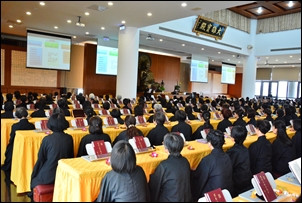TOMB SWEEPING FESTIVAL TOPICS II

The Concept of Repaying Kindness: To Benefit All Sentient Beings through Actual Practice
Purifying our minds and society through diligent practice of the Dharma at the Dharma assembly:
Dharma Assemblies

During the Tomb-Sweeping Festival, in late March or early April, Dharma Drum Mountain will hold the Compassionate Samadhi Water Repentance Assembly, the Seven-day Amitabha Chanting Retreat for Repaying Kindness, and the Earth Store Dharma Assembly at its branch monasteries and practice centers worldwide. Every year people would enthusiastically participate in these events to show gratitude to their ancestors and pray for blessings for their deceased loved ones and relatives by engaging in Dharma practice—making offerings to temples and monasteries, giving donations, worshipping the Buddha, lighting the lamp, and chanting or reciting the Buddha’s name—benefiting both the living and the dead.
The Compassionate Samadhi Water Repentance Assembly
Just like we need to clean the inside of a bottle first before pouring in fresh water, repentance is an essential and effective method of Buddhist practice. By constantly repenting our bad karma we will be able to keep our mind clear and pure.
Buddhist Concept of Causality and Karma from Story of Master Wu Da

The text of the ritual for the Compassionate Samadhi Water Repentance Assembly illustrates the Buddhist concept of causality and karma, and so it reminds people not to create any form of evil karma. Legend has it that the repentance text was composed by Master Wu Da (809-882), an imperial Dharma teacher in the Tang Dynasty. When the Emperor offered him a precious sandalwood seat as a gift, his arrogance triggered the ripening of his karmic retribution that caused a human-face abscess on his knee. So he went to Arhat Kanaka for help, who used the Samadhi Dharma water to cure the abscess and clear the karma. To show gratitude, Master Wu Da then composed the text that is now known as the Samadhi Water Repentance, and recited the text as a regular practice to eliminate his karma and as an endeavor to deliver his karmic debtors in the past. It has since become a most valuable and popular repentance rite in the Chinese Buddhist tradition, especially for traditional holidays, such as the Tomb-Sweeping Festival, when the Water Repentance rite will be held at most Buddhist monasteries and temples, for Buddhist practitioners aspiring to repent their erroneous actions and help cleanse the karma of their friends and relatives. Attending the Water Repentance service is therefore a significant way to repay kindness of others.
Samadhi Water Repentance Dharma Service Is All-Encompassing
The ritual of the Samadhi Water Repentance Dharma service is all-encompassing, including singing the praise, chanting the repentance text, and worshipping various Buddhas and bodhisattvas. Aspiring to perform repentance to purify the karma, one should show sincerity and have right mindfulness, and earnestly pray to the Buddhas and sages of the ten directions to witness one’s resolve to change and eliminate defilements from within.
Extended Video Selection I
 Buddhist Repentance Rituals
Buddhist Repentance Rituals The contents of different repentance rituals are compiled based on different Buddhist sutras. Repentance rituals can serve as a way of practice, help one cure one's karmic illness and achieve peace of mind when facing karmic obstacles or receiving karmic retribution.
Extended Video Selection I
 Why Should We Repent? How Should We Repent?
Why Should We Repent? How Should We Repent? To repent, either to our own conscience, to the person we have done a disservice, or in public, is to express responsibilities for ourselves. By repenting on a daily basis we can gradually purify our body and mind, and therefore eliminate our karmic obstacles.
Extended Reading
Traslation: Kate Huang
Editor : Chang ChiaCheng (張家誠)
Photos : Nung Chan Monastery